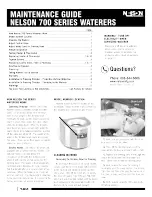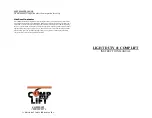
InSpec Remote I/O HUB (ATEX, IECEx)
Section 3: Installation Details
11
WIRING METHODS & MATERIALS
The electrical installation must be in accordance with applicable national standards (equivalent to IEC/EN
60364) in addition to the requirements for installation in hazardous areas according to IEC/EN 60079-14
"Electrical installations in hazardous locations" or equivalent national standards. Local wiring ordinances may
also apply.
Only personnel who are experienced with field wiring should perform these procedures.
Personnel installing field wiring must strictly adhere to all manufacturers datasheets and
instructions.
The conduit or cable gland threads must be the same thread size as the enclosure’s entry thread
size, either M25 & M20, or 1” and ¾” NPT, as determined by the model number – See Section 2:.
Cable
glands
o
A barrier gland is required due to the volume of the enclosure.
o
Cable glands must be used with an appropriate cable, as per the manufacturer’s
specifications, to maintain integrity of the installation.
o
The cable must be adequately supported.
All wires must be terminated, complete with crimping lugs.
Terminal block screws must be tightened to a torque of 4.4 to 5.3 lb.in.
The hazardous area end of any unused cores shall be either a) connected to earth or b) adequately
insulated by means of suitable terminations (Insulation tape alone is not recommended) and
connected to earth in the non-hazardous area.
CABLE/WIRE SELECTION
All field wiring must have a minimum specification of 0.5mm², 75°C, VW-1. It must be suitably sized for the
application and local conditions, conform to national standards (equivalent to IEC/EN 60364) in addition to the
requirements for installation in hazardous areas according to IEC/EN 60079-14 "Electrical installations in
hazardous locations" or equivalent national standards. Local wiring ordinances may also apply.
Considerations such as (but not limited to) the supply voltage and frequency, load current, voltage drop,
temperature, cable mounting and grouping factors should be considered.
In general, Sensia recommends the following types of cables for the associated signal types:
Analogue Signals :
Screened twisted pairs with an overall screen.
Blue cable sheath for Intrinsically Safe circuits.
Pulse/Frequency Signals :
Screened twisted pairs with an overall screen.
Blue cable sheath for Intrinsically Safe circuits.
DC Digital Signals :
Multicore with an overall screen












































